15 Interesting Facts about Nelson Mandela
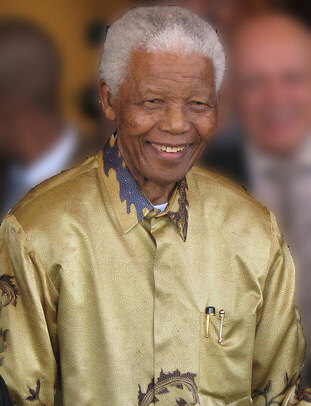
By South Africa The Good News, via
Wikimedia Commons
Nelson Mandela is best known for his advocacy against the apartheid in the
1940s through the 1960s in South Africa and his rise to the presidency of South
Africa in 1994, just a few years after his prison release in 1990. He is a
remarkable man with an unassuming quiet demeanor that hides the breadth of his
life achievements. Mandela has always been a private man but his health has been
failing recently, resulting in him has staying home more or being in the
hospital. Mandela was born in 1918 and is approaching one hundred years old. He
has been active on the world political scene for decades and most people with a
global sense would recognize his face but there is a lot about this man that
many may not already know, so here are 15 interesting facts about Nelson
Mandela.
15) Mandiba
Most South Africans don’t even call him Mandela, instead they refer to him as “Mandiba,”
from his Thembu clan name. It also is a title South Africans use for a person
who is accorded high respect but not everybody is referred to by their clan name
because it is saved for someone that has earned respect from their community.
Mandela was first called Mandiba at the age of sixteen after the rite of
circumcision and decided that it was “time that I became a man", according to
Mandela in his 1994 autobiography called "Long Walk to Freedom". It was at that
point, the age of 16, that Mandela was called Mandiba. In the 18th century there
was a Thembu Chief called Mandiba and he was Mandela’s ancestor. The Thembu
people are native to the eastern part of South Africa and speak Xhosa. They are
primarily migrant workers who have experienced shrinking land ownership over the
years at the hands of colonialism and famine.
Mandela wasn’t called Nelson until his first English teacher named him that
when he was a young boy; South Africans and other admirers of Mandela have other
names for him as well. His birth name was Rolihlahla and it means someone who
pulls tree branches along with causing trouble in Xhosa, it was given to
him by his father. Sometimes people call him Rolihlahla as a way to honor his
birth name and other South Africans refer to him as “Tata,” which means “father”
in Xhosa, he has many other names too because he is so endeared.
Tembuland, home of the Thembu people
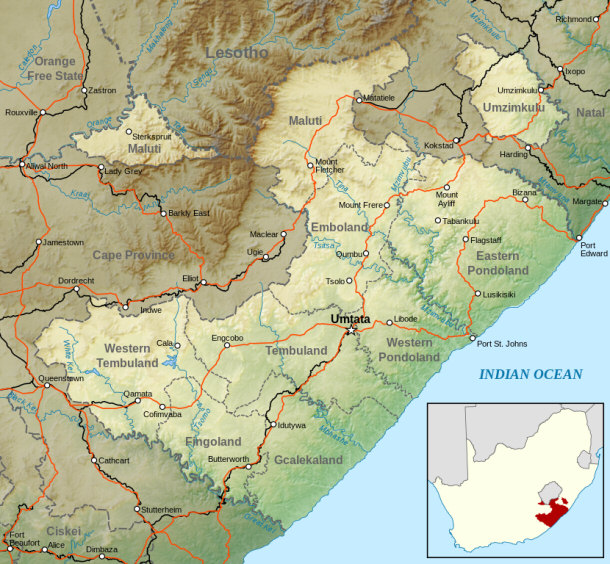
By Htonl, via
Wikimedia Commons
The book, Long Walk to Freedom
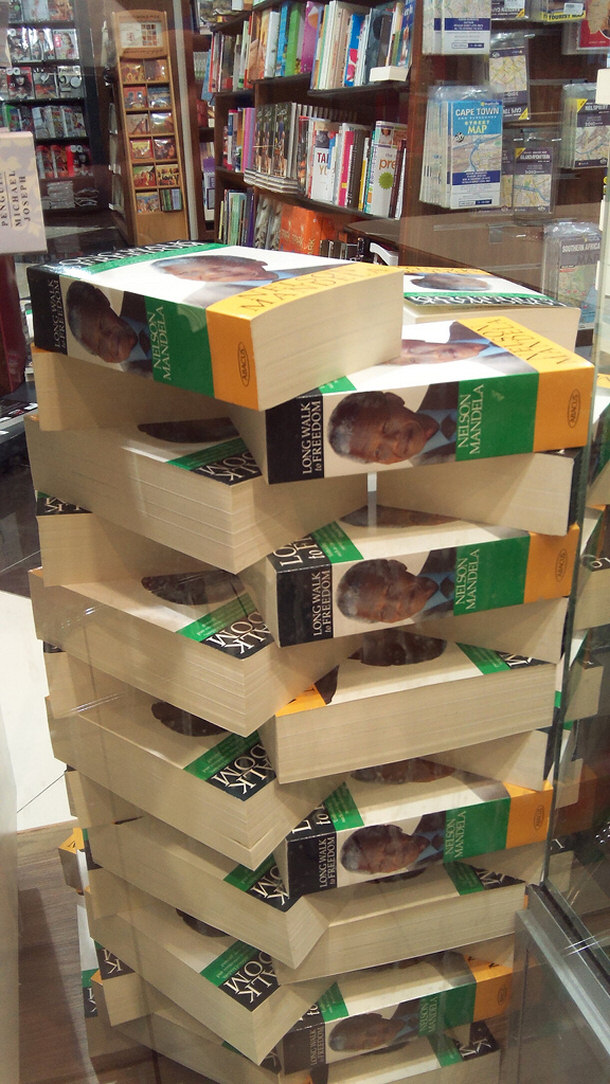
14) Tuberculosis
Mandela contracted tuberculosis for the first time at Robben Island, a maximum
security institution off the coast of South Africa, during his imprisonment of
27 years then again at Pollsmoor Prison in Cape Town and for a last time at
Victor Verster Prison in Western Cape. The conditions at Robben Island and
Pollsmoor Prison were atrocious as well as unsanitary, which is how he
contracted tuberculosis then was finally transferred to the cleaner Victor
Verster Prison. In 1988 at Pollsmoor Prison, Mandela was diagnosed with and
treated for tuberculosis. The disease continues to plague him and his elderly
years have brought on multiple other lung complications; doctors believe these
complications stem from the tuberculosis he suffered from in the 1980’s. The
Washington Post in 2004 reported that Mandela visited the International AIDS
Conference in Bangkok where he went to raise awareness about tuberculosis and
its dangers. BioSpectrum reports that nearly one quarter of all tuberculosis
cases are in Africa and that funding to develop a vaccine is severely limited.
One of Mandela's primary concerns as a public figure is to raise awareness about
tuberculosis and AIDS because of this.
Tuberculosis x-ray
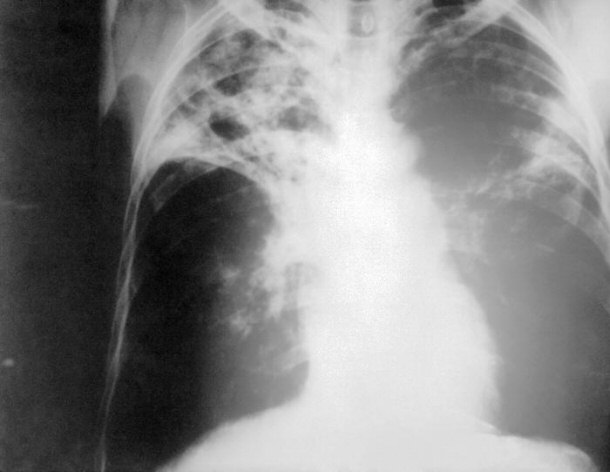
Robben Island Prison entrance
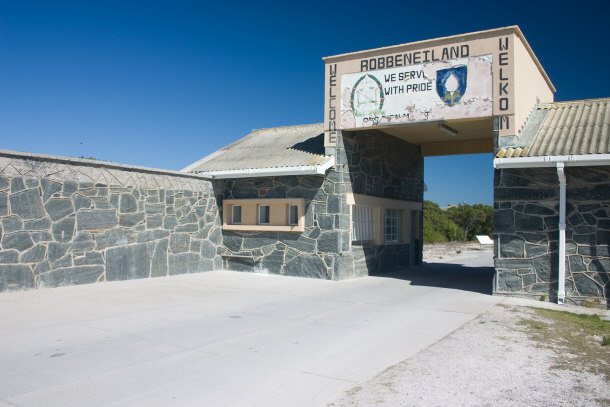
Victor Verster Prison, now Drakenstein Correctional Centre
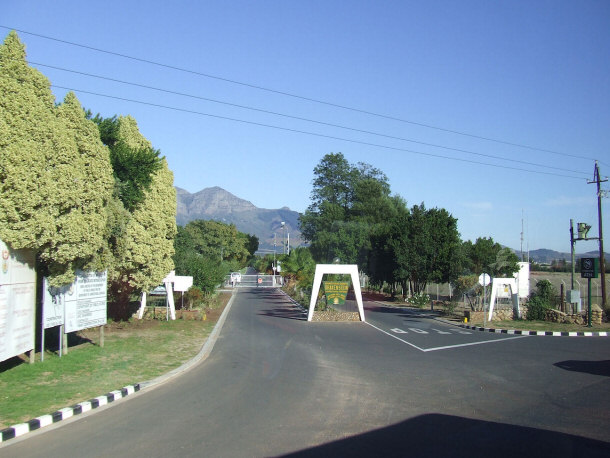
By Robert Cutts, via
Wikimedia Commons
International AIDS Conference, Bangkok in 2004
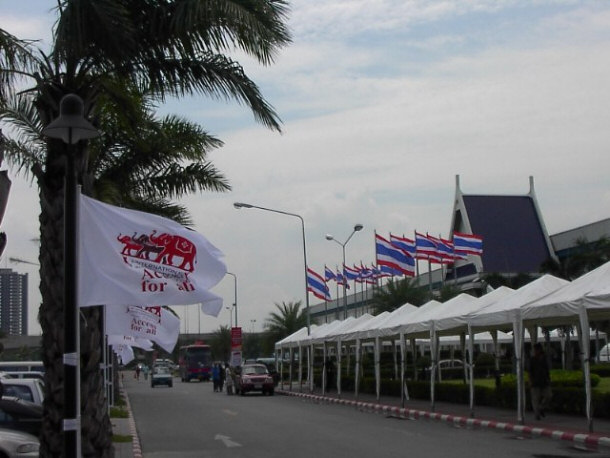
13) Nobel Peace
Prize
Mandela was awarded the Nobel Peace Prize in December of 1993 shortly before he
was elected president of South Africa and the apartheid ended in 1994; This may
be one fact that many people know or can assume about Mandela. The Nobel Prize
committee awarded Mandela the prize “for his work for the peaceful termination
of the apartheid regime and for laying the foundations for a new democratic
South Africa”. The prize was awarded jointly to both Mandela and Frederik Willem
de Klerk, the last president of an apartheid South Africa. He worked with
Mandela to end apartheid as well as usher in a peaceful transition period to a
new South African society and government.
Mandela referred to Martin Luther King Jr as his “predecessor” in his
acceptance speech and credited the millions of others who also spoke out against
apartheid, in his traditional modest fashion. He said in his speech, “We stand
here today as nothing more than a representative of the millions of our people
who dared to rise up against a social system whose very essence is war,
violence, racism, oppression, repression and the impoverishment of an entire
people”. Mandela kept insisting that his country use the award to consider the
welfare of its children, South Africa’s most vulnerable and important citizens
of the future.
Apartheid sign in South Africa
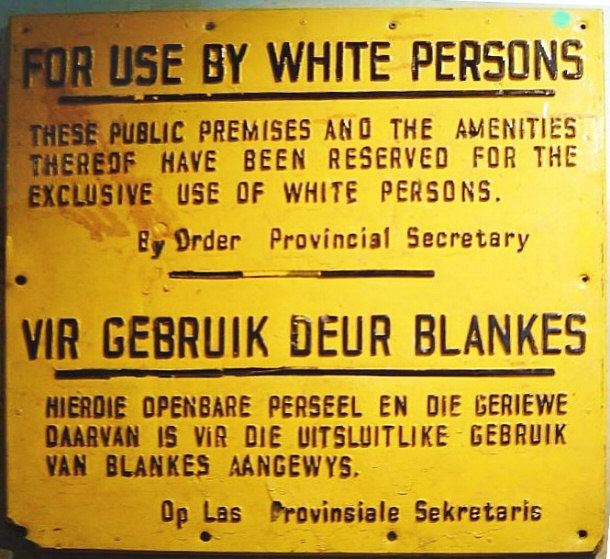
Martin Luther King Jr.

12) Prison Poetry
|
William Ernest Henly
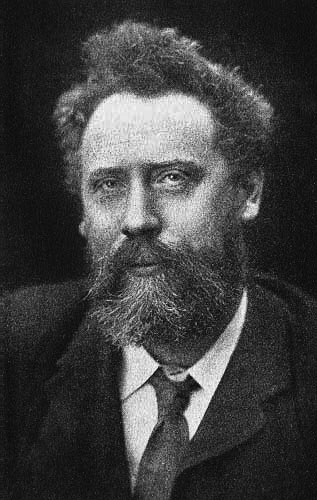
|
Poetry, reading and writing sustained Mandela when he was in jail. With both
leaders and followers, prison is a microcosm of society. Mandela emerged out of
prison as a leader through inspiration and sheer will. He recited William Ernest
Henley’s poem “Invictus” to his fellow inmates. One of the most famous lines of
that poem, “I am the master of my fate”, inspired Mandela to keep fighting
apartheid even while imprisoned for nearly three decades. Ironically, it was
Henley’s tuberculosis diagnosis that inspired him to write “Invictus" and his
recitation is enacted in the 2009 movie of "invictus".
Obtaining reading materials was difficult for prisoners at Robben Island,
where Mandela spent eighteen of his twenty seven years in prison. Books
prisoners requested from the library were often banned and sent back before they
could read any of them. In his autobiography, Mandela recalls the time he and
his inmates were able to trick prison authorities into subscribing to The
Economist in order to receive the news they were missing out on but this only
lasted a short time before the subscription was canceled. Mandela also remembers
the time he stole a newspaper he saw laying around and was reprimanded for it.
He was only allowed to send and receive one letter every six months, he used
this allowance to write to his wife at the time named Winnie Mandela. Mandela
wrote a letter to her on April 15, 1976, stating that he dusts the photo of her
in his cell each morning as if he were touching her body.
Invictus
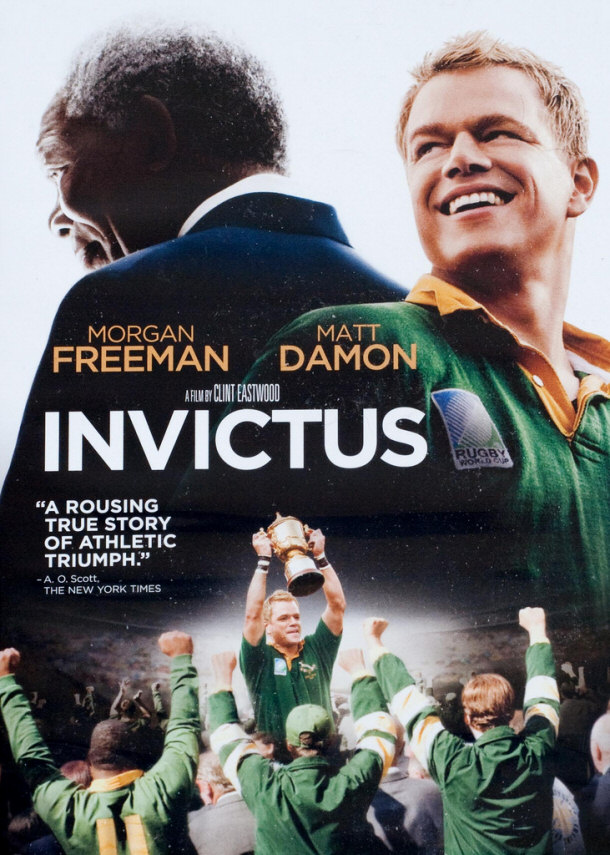
Winnie Mandela
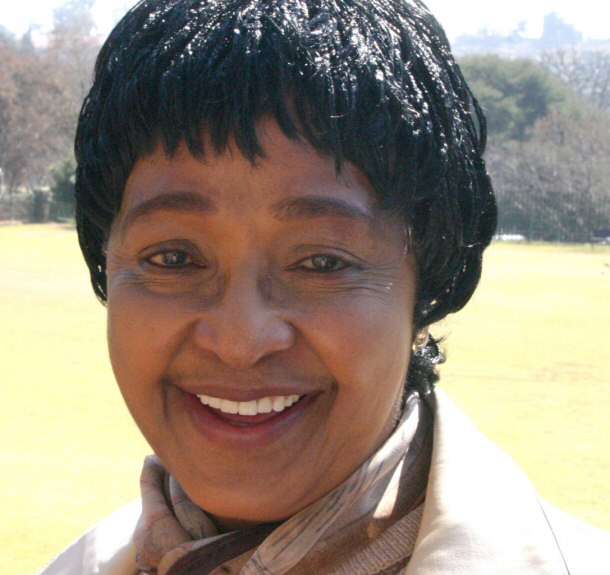
11) Winnie Mandela
|
Winnie and Nelson Mandela
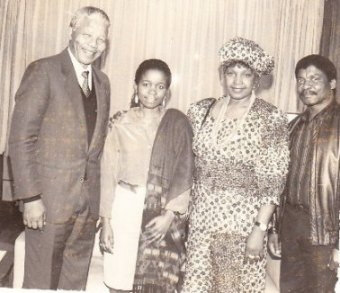
|
Mandela was married to his second wife named Winnie Mandela, maiden name was
Madikizela, from 1958 to 1996 and it was his longest marriage of the three. Most
people don’t know that Winnie is just as active in politics as Mandela; she is
an outspoken and determined woman who has been involved in many scandals over
the years. After Mandela’s arrest and sentencing, she continued to work with the
African National Congress (ANC) to protest apartheid. She was arrested and spent
over a year in prison. She was tortured while in prison because she was seen by
the South African government as a terrorist. Winnie was driven out of her home
in Soweto and put under house arrest in Brandfort. She was also involved with a
group of anti-apartheid activists who were accused of kidnapping and murder.
Winnie outwardly supported killing apartheid sympathizers; she was found guilty
for her involvement with the kidnapping and murder ring by the Truth and
Reconciliation Commission in 1997. In addition to the charges, she was convicted
of financial fraud while serving as a parliament member.
Despite all of this, Winnie has remained quite popular in South Africa. She
served as the president of the African National Congress Women’s League and also
served in South Africa’s parliament. She is quite critical of her ex-husband
Mandela in the press, yet often denies her disparaging statements. In 2011, the
movie Winnie Mandela was produced and depicts Winnie’s life with Mandela, it
stars Jennifer Hudson.
South Africa Parliament
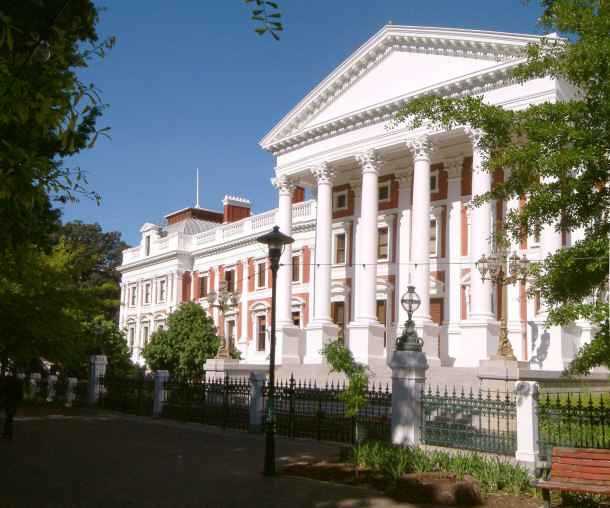
By PhilippN, via
Wikimedia Commons
10) Poor Student
Like many famous world leaders and people who make a difference, Nelson Mandela
was not a very good student. He struggled in school and failed to complete two
degrees; He was even expelled from one university for participating in a protest
ran by students. It wasn't until he was in prison when he completed his first
degree, where prisoners were surprisingly allowed to work toward them. In his
autobiography, he comments on the fact that he was always surprised to find that
political leaders he respected had never completed a college degree. He realized
that to be an articulate leader did not mean you had to be educated in any
specific way and this perhaps is why it took him so long to finish his first
degree. He wrote, “It was not lack of ability that limited my people, but lack
of opportunity”. Mandela was seen as a country boy at the more metropolitan
educational institutions he attended and this could have accounted for his
reluctance to really delve into his studies. Nonetheless, he now holds dozens of
honorary degrees from institutions around the world. His failure to excel as a
student in his early schooling and university years in no way impacted his
ability to change both his country as well as the world in his later life.

9) Law Practice
Mandela was a practicing attorney before he was arrested and this is when he met
his second wife, Winnie. Mandela’s friend Oliver Tambo joined Mandela to open
South Africa’s first black law firm called Mandela and Tambo. Mandela attributes
his confidence in law practice to his first boss H.M. Basner, an attorney who
supported African rights. Mandela and Tambo’s office in Johannesburg was
fittingly located directly across the street from the Magistrate’s Court in
downtown Johannesburg. They helped and represented blacks who were discriminated
against because of their color. These clients had their family land taken away
from them, were refused entrance into a Whites Only store and were often
imprisoned for violating apartheid laws. Mandela said his law firm “was a place
where they (black Africans) could come and find a sympathetic ear and a
competent ally, a place where they would not be either turned away or cheated, a
place where they might actually feel proud to be represented by men of their own
skin color”. In his autobiography, Mandela fondly remembers many of the people
he represented in court during his time practicing as a lawyer.
Oliver Tambo
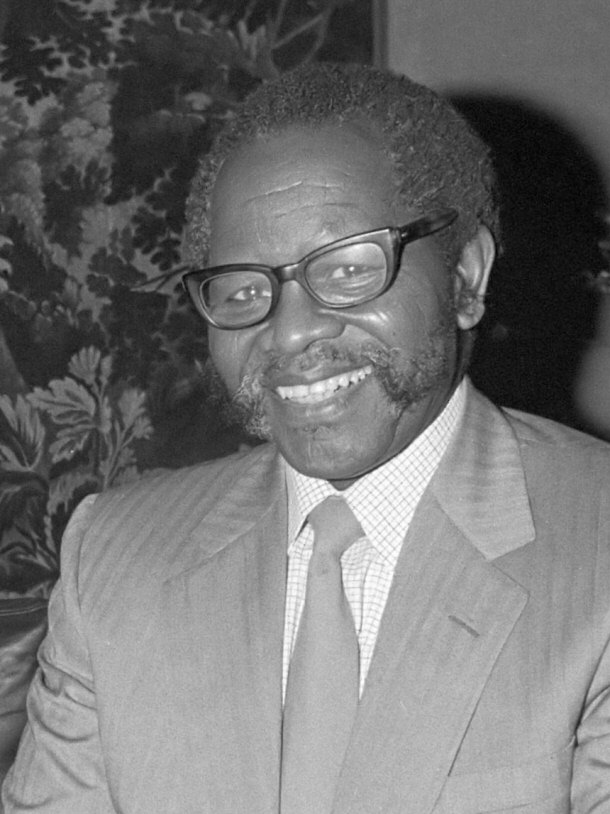
By Rob C. Croes / Anefo, via
Wikimedia Commons
Mandela and Tambo's Law Firm, prior to renovations
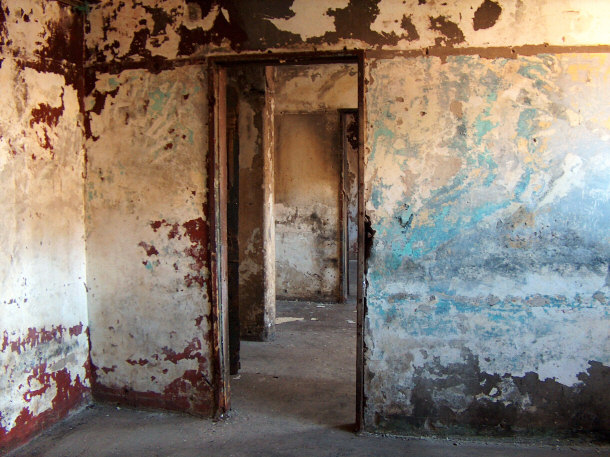
By Jackie05, via
Wikimedia Commons
8) First Black
President of South Africa
Not only did Mandela open the first black law firm in South Africa but in 1994
he became the first black president of the country and he was the first
president of South Africa to be democratically elected. Millions of South
Africans stood in line for three days straight to cast their vote for presidency
on April 27, 1994; Mandela won almost two thirds of the votes and thousands of
people celebrated across Pretoria during his inauguration ceremony. April 27th
has since become a national South African holiday to celebrate the end of
apartheid and beginning of Mandela’s presidency, it is known as Freedom Day.
Mandela served as president from 1994 until 1999 and while in office he
established the Truth and Reconciliation Commission in 1995. This Commission
investigated instances of human rights violations under the apartheid and
encouraged violators to come forward and confess their racist crimes. In fact,
many violators personally confessed to people and families who were affected by
their actions. Even though it was not as successful as most had hoped, the Truth
and Reconciliation Commission was able to convict many violators of human
rights. Mandela was also instrumental in rewriting a new democratic constitution
for South Africa, the first of its kind in the country. Mandela divorced Winnie
during his presidency and married his third as well as current wife, Graca
Machel. Mandela promised to only serve as president for one term and stepped
down from the presidency in 1999, staying true to his word. He has remained
politically active after his resignation but it has been difficult for Mandela
to participate in any political events with his recent health ailments.
Nelson Mandela casting his vote in 1994
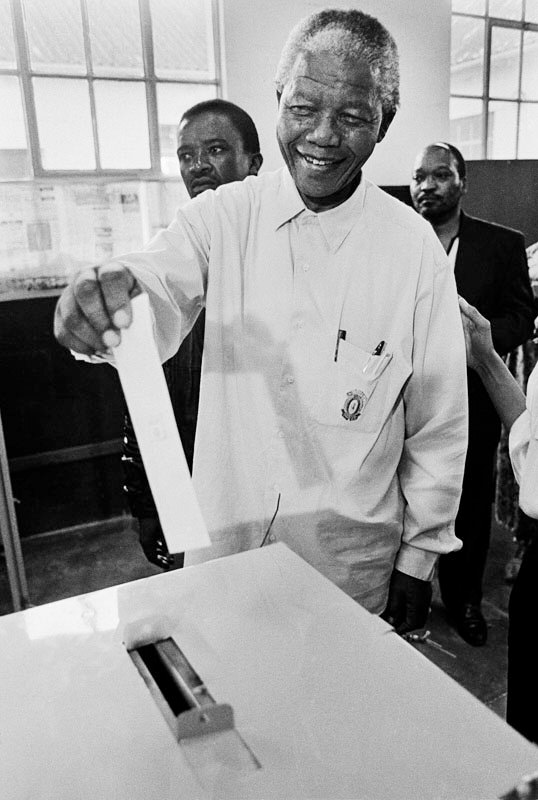
By Paul Weinberg, via
Wikimedia Commons
Graca Machel
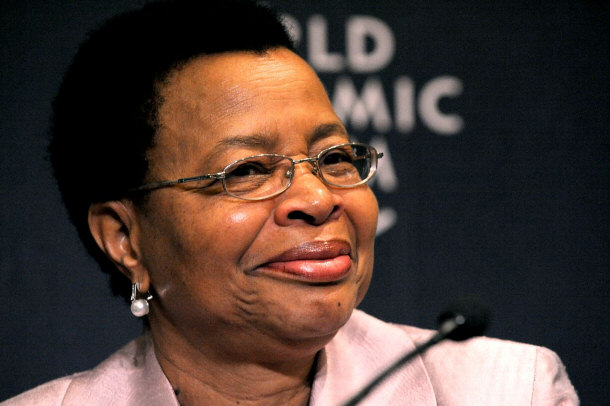
By Zahur Ramji, via
Wikimedia Commons
7) Qunu Family House
Mandela returned to his childhood home of Qunu in the Eastern Cape of South
Africa after he was released from prison in 1990; a museum dedicated to
Mandela’s life and achievements is near his home, where a billboard poster of
Mandela while he was president graces the front. CBS News explored Mandela’s
home and Qunu village in the spring of 2013, taking a collection of photographs.
Qunu is a modest small village with classic Thembu architecture, where the
buildings are round and thatched. Mandela built a replica of his prison dwelling
and a large home on his compound in this village. There is not much around
Mandela’s Qunu home except vast amounts of green grassy land for miles and a
security gate greets visitors upon entry into the compound. Qunu still stands as
a primarily agricultural village with sheep and cattle roaming the streets. It
was important for Mandela go to back home and retire to where he was raised as a
child because he is a very nostalgic man who appreciates his roots. Not many
people have been allowed in Mandela’s Qunu compound, so there is very little
known about what life is like behind the gates. One can only assume that Mandela
is well taken care of in his home and comfortable, happy to be back where he
belongs.
Mandela's home
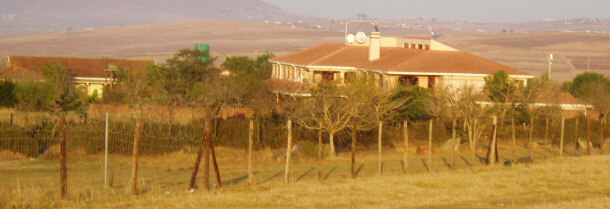
By Fbrierley, via
Wikimedia Commons
6) Graveyard
Controversy
Mandela also built a graveyard on his compound in Qunu, where his two children,
his parents and his sister are buried. It is Xhosa tradition to be buried in
your home village and Mandela has made it clear that he wishes to be buried near
his other family members. The graveyard is quaint and overgrown, some argue it’s
not a fitting place for such an important man but Mandela maintains his burial
wishes. Mandela’s children both died at young ages; His daughter, Makaziwe, only
lived nine months before she died and his son, Thembekile, was killed in a car
accident at the young age of 22. While Mandela suffers in the hospital, Qunu
residents have left balloons as well as other small tokens of their admiration
outside the graveyard and family compound.
Controversy surrounding the graveyard began in 2011 when Mandela’s grandson,
Mandla, had the graves of Mandela's children moved out of the Qunu family
graveyard. Many of Mandela’s family members sued Mandla, indicating that he did
not get permission from anyone to move the graves. This accusation has incited a
heated legal battle about bringing the children back to the graveyard in Qunu
where Mandela hopes to be buried after he dies and it is still an ongoing debate
that has yet to be settled in court. Recently, Mandela’s family members have
accused grandson Mandla of only wanting fame for himself out of the entire
ordeal.
Thembekile Mandela
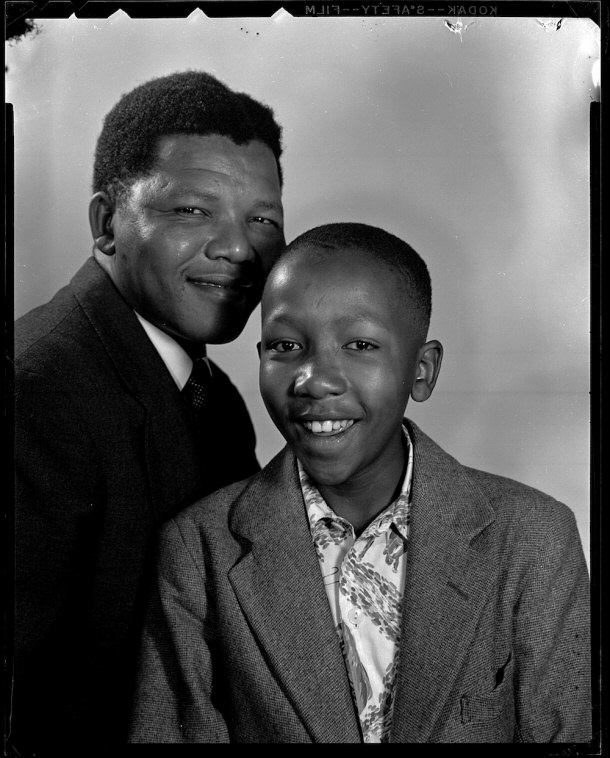
Mandla Mandela
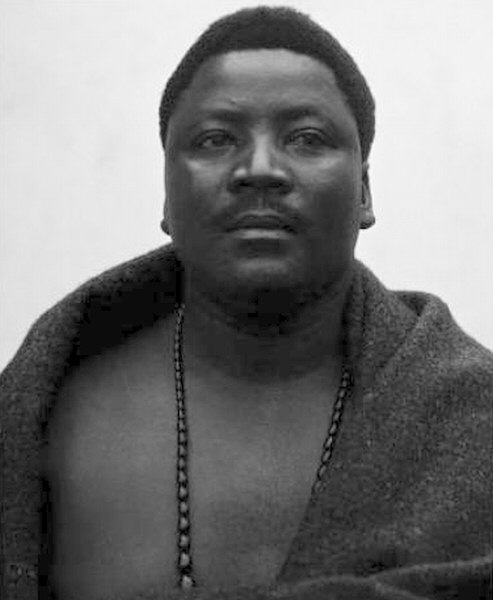
5) Telling Lies
In Mandela’s autobiography, he admits to telling many lies as a young adult to
get what he wanted and this little known fact may be surprising to most people
due to him being admired for his leadership qualities. Mandela would often leave
out pertinent information to those who were helping him, either by giving him
employment or room and board. He admits that he “cursed [him]self for not having
told the whole truth” and he confesses, “I had become so used to my deceptions
that I lied even when I did not have to”. This characterization of Mandela is
surprising, since he is a leader of many and lead a truthful life in his later
years. His self reflection is interesting because he indicates a sense of regret
at telling these lies when he was younger to achieve his goals.
Young Nelson Mandela
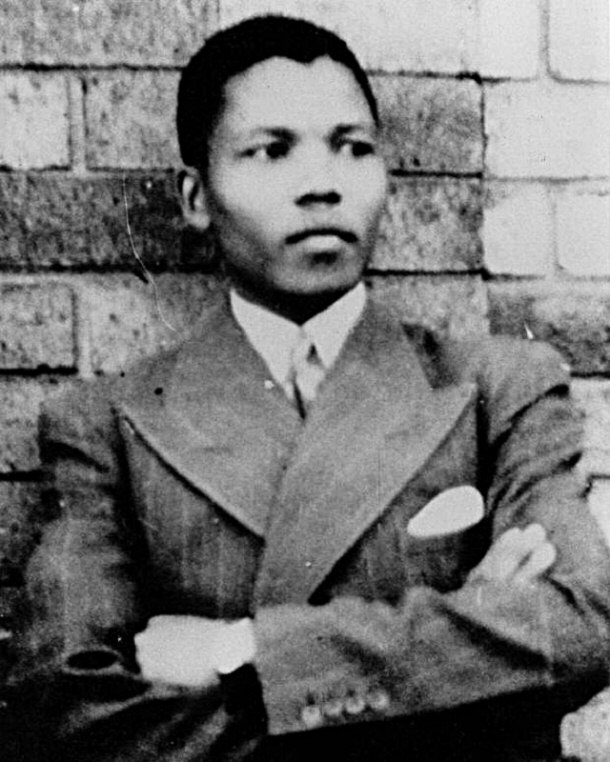
4) Illnesses in
Prison
Tuberculosis was not the only illness that Mandela battled with while in prison;
he suffered many ailments during the 27 years he was in jail because of the
length of time he spent incarcerated and the dismal conditions under which he
lived in. The ailments are an instigators of his health concerns that he’s
suffered later in life and to this day. In one instance, Mandela injured his
heel while playing tennis in 1979 and he had to get surgery on it in Cape Town.
At the time he was at Robben Island, so a visit to Cape Town meant a daunting
journey across the sea. While in the hospital, bone fragments were found in his
heel and were removed surgically. The surgery was successful, Mandela actually
enjoyed his experience at the hospital because he was well cared for and was
able to get restful sleep. When Mandela was undergoing treatment for
tuberculosis, he was admitted to a hospital that had never had a black patient
before and had an enjoyable experience. In addition to tuberculosis and heel
surgery, he underwent prostate surgery while in prison in 1985.
It is no surprise that prison conditions would have caused suffering and
disease amongst its prisoners. As remarkable and resilient as he is, Mandela was
no exception. He was treated for multiple issues throughout his 27 years in
prison but managed to enjoy his stays at the hospitals. It is a testament to his
will that Mandela has lived so long after the medical complications he
experienced while both in and out prison.
Nelson Mandela's Robben Island prison cell
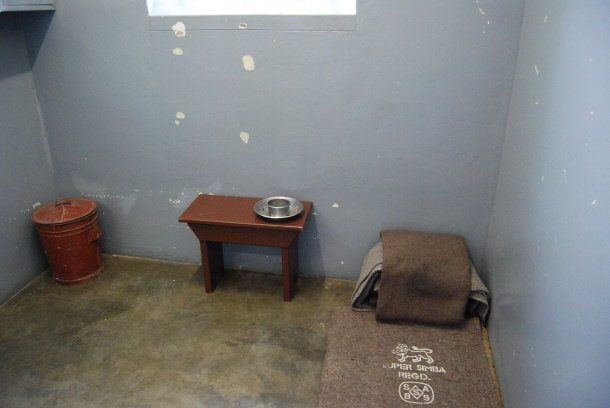
By Paul Mannix,
Wikimedia Commons
Cape Town Hospital called Somerset
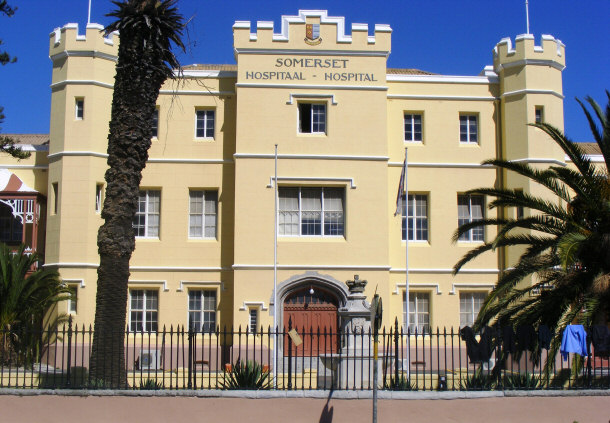
3) Love for Children
Mandela has a soft spot for children, he not only spoke about them in his
Nobel Peace Prize acceptance speech but he also started the Nelson Mandela
Children’s Fund in 1995 when he was president of South Africa. According to
its web page, the fund “strives to change the way society treats its
children and youth” and it focuses on eliminating “hunger, abuse,
exploitation and homelessness”. The fund has a variety of programs from
teaching children sports to educating them and their families about
sustainable food practices at home, the fund also has a partner branch in
the United States. The Nelson Mandela Children’s Hospital was built to help
treat childhood disease and illnesses, including those that are particular
to the South African region.

2) Return to Robben
Island
After Mandela’s release from prison, he returned to Robben Island in 1990. He
went there in order to convince political prisoners to accept the government’s
offers of amnesty and prison release. He met with prisoners during his visit,
though many of them disagreed with what he was asking them to do. Despite the
chances they would decline the government’s offer, it was still worth it for
Mandela to make the attempt because it was a part of the larger battle of ending
apartheid. He was emotional while back on the prison grounds but he said that he
didn’t really have much time to tour the prison and kick up painful memories of
his time spent there. However, these attempts were ironic because Mandela
himself had rejected previous deals of release by the government.
Nelson Mandela returns to his former cell at Robben Island
Prison
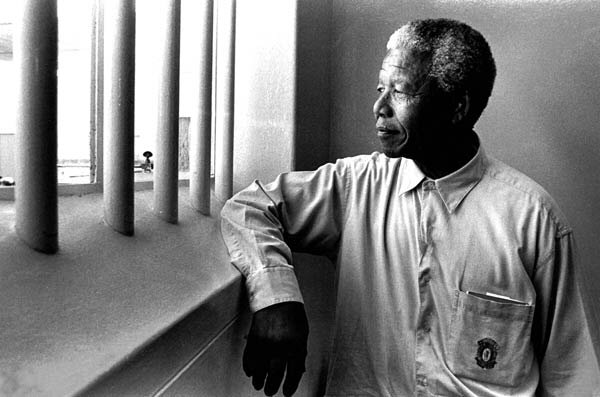
By Jurgen Schadeberg, via
//www.jurgenschadeberg.com/
1) Mandela Day
July 18th is now known as Mandela Day across the world, The United Nations
General Assembly established the day in 2009. Mandela Day even has its own
website, where it encourages people to celebrate it in the same spirit of
Mandela by helping others. It says that because Mandela dedicated 67 years to
human rights, people should dedicate 67 of their minutes on Mandela Day doing
the same. Mandela Day encourages the next generation of world leaders to begin
taking action now, an idea that Mandela is passionate about.
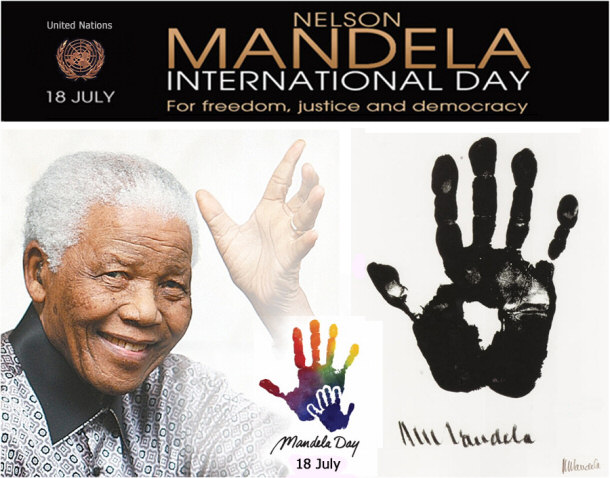
By
Martijn van Mensvoort, via
www.handresearch.com
Final Words
Mandela’s life and achievements are fascinating as well as varied. He has
certainly affected millions of people across the world and his legacy is that no
matter your upbringing or background, you can go on to make a difference. There
are a variety of biographies that have been written about Mandela and perhaps
reading some can muster up confidence in your abilities to achieve your own
dreams, despite challenges as well as opposition.
Specific People
15 Things You Should Know About Stephen Hawking
15 Fascinating Facts about Michael Jackson
15 Fascinating Facts about Al Capone
15 Interesting Facts about Mother Teresa
15 Interesting Facts about Walt Disney
15 Interesting Facts about George Washington
15 Interesting Facts about Gandhi
15 Interesting Facts about Franklin Roosevelt
15 Interesting Facts about Ben Franklin
Top 15 Interesting Facts about Archimedes
15 Little Known Facts about Martin Luther King
15 Interesting Facts about Ronald Reagan
15 Interesting Facts about Nelson Mandela
15 Interesting Facts About Shakespeare
15 Interesting Facts about Marie Curie
15 Interesting Facts About Julius Caesar
15 Interesting Facts about Leonardo Da Vinci
15 Interesting Facts about Captain James Cook
15 Interesting Facts about John F. Kennedy
15 Interesting Facts About Cleopatra
15 Interesting Facts about Barack Obama
15 Interesting Facts About Albert Einstein
15 Interesting Facts about Adolf Hitler
15 Interesting Facts about Christopher Columbus
15 Interesting Facts About Bill Gates
People Related
15 Most Bizarre Things Purchased by Celebrities
Top 15 Reasons Why People Commit Suicide
25 Individuals Who Thrived with Savant Syndrome
20 Celebrities Who Invented Amazing Things
Top 15 Drugs People Commonly Overdose and Die From
Top 15 Myths about Death
15 Unusual Ways People Have Died
15 Crazy Festivities Around the World
55 Celebrities With Physical Imperfections
15 Funny and Unusual Ways Interviews Have Been Held
15 Weird Ways People Improve Their Confidence
15 Of the Darkest Crime Personalities We Hope to Never Meet
15 People Who Killed for a Living
15 Famous Celebrity Meltdowns
14 Fun Activities That Have Ended Up In Death
15 Facts & Info About Human Trafficking
Shorter Top Lists:
10 Billionaires as Wasteful or Fanciful as They are Wealthy
10 Ruthless Serial Killers Who Were Never Caught
10 Dangerous Serial Killers
Informational:
Detecting Lies: How to Tell Whether or Not Some is Truthful
Cannibalism in History and the Modern World
What Your Favorite Color Reveals About You
What is a Weirdo? Defining Weirdness in Society
Media's Effect on Society
How to Attract Beautiful Women |